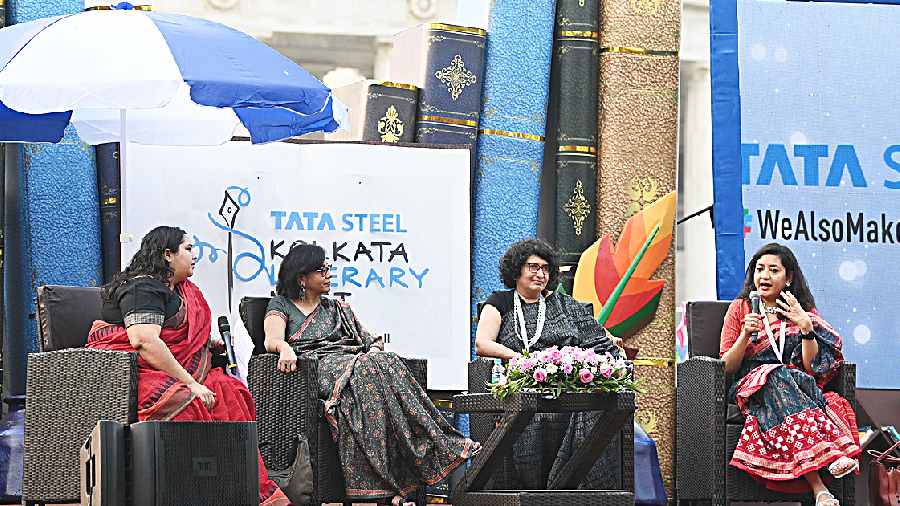Zan, Zendegi, Azadi. Women, Life, Freedom.
The chant of the current protests in Iran, raging since September 2022, has relevance in India as well, a panel said on Day Three of the Tata Steel Kolkata Literary Meet, in association with the Victoria Memorial Hall and The Telegraph.
Ghazala Wahab, executive editor of the monthly magazine Force, where she writes on homeland security, terrorism, Jammu and Kashmir, Left-wing and religious extremism; Sharda Ugra, veteran sports journalist; and Anuradha Kapoor, founder of Swayam, which works for women’s rights, discussed the Iran protests and how they connect to the situation in India.
The moderator, Sumona Chakravarty, vice-president of DAG's (Delhi Art Gallery) Museums Programme, asked what the three words — zan, zendegi and azadi — meant for the panellists.
“For me, the phrase rings a bell. It encapsulates my work. All over the world, women are fighting for their rights. Because nowhere in the world are women free, and have equal rights. It is an extremely personal phrase for me,” said Kapoor.
The word ‘azadi’ entered the Indian women's movement from Pakistan, around 30 years ago, she said. It came with Kamla Bhasin (rights activist, who died in 2021), who visited Pakistan where the slogan was raised by women demanding their rights, said Kapoor.
“Now, that slogan has been adopted even politically. Even political rallies have been talking about azadi. When we are saying azadi, we are not saying azadi from our country. We are saying azadi from oppression, from violence, from poverty, from unemployment, all of the things that keep women behind. The azadi slogan has been adapted in many ways across the country and by many players. It is no longer only a women's movement nara (slogan),” she said.
For Ugra, the phrase was inspirational.
"A lot of it then gets connected to your body. You are using the woman's body in any way to keep her a little boxed, by saying that you can’t go to a football stadium, which is what happened in Iran. One of the fans committed suicide. She had disguised herself as a man but was caught by police. During the trial, she could not take it and killed herself. This was about nine years ago.
“A similar thing is happening with Indian female wrestlers who are protesting (accusing the wrestling federation's president of sexually and mentally harassing young female athletes). The same thing, Zan, Zendegi, Azadi,” she said.
The protests in Iran were triggered by the custodial death of Mahsa Amini, 22, on September 16, 2022. She was arrested for improperly wearing her headscarf and then apparently beaten into a coma by Iran’s morality police.
Wahab called the oppression of women in the name of religion "gaslighting of the earliest order". “All the oppression that women suffer, whether in Iran or in India or anywhere else, all of that comes from laws made by men in the name of religion, for them. This is a gaslighting of the earliest order.
Women have been told that ‘you don't understand what is written (in religious scriptures). So, let us interpret it for you’,” said Wahab.






